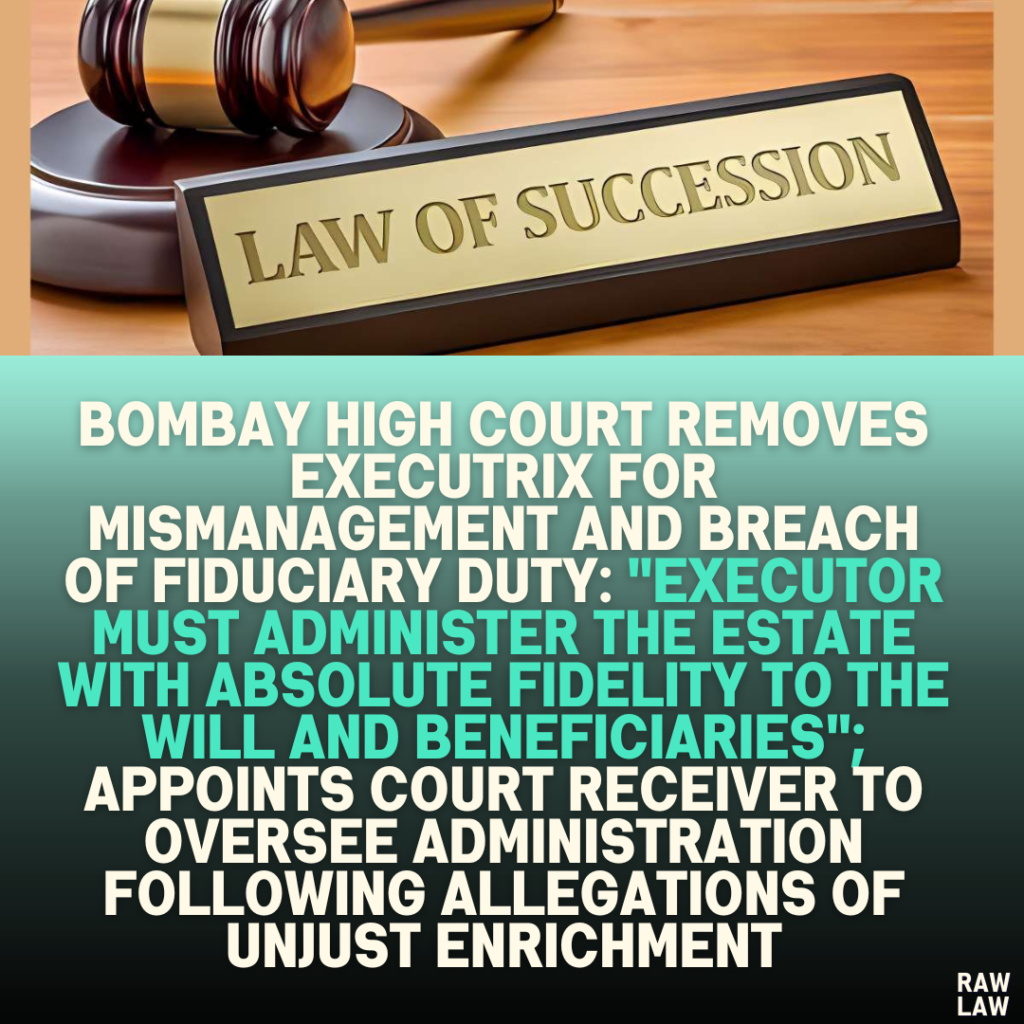Court’s Decision
The Bombay High Court exercised its power under Section 301 of the Indian Succession Act, 1925, to remove the executrix (Respondent) from her position due to gross misconduct and breach of fiduciary duties. The court replaced the executrix with the Court Receiver, Bombay High Court, as an administrator for the estate, specifically regarding the property named “Ambadi House.”
The executrix was directed to:
- Deposit the original property documents with the Court Receiver.
- Exhibit final accounts showing the administration of the estate thus far.
- Cease all further actions under the granted probate.
The court emphasized that “gross misconduct and mismanagement by an executor nullify the trust and confidence reposed by the testator.”
Facts of the Case
The case revolved around the will and testament of the deceased, dated April 21, 2012. The deceased had four children, including the executrix (Respondent) and three petitioners. “Ambadi House,” located in Thrissur, Kerala, was bequeathed to all four children in equal shares. The will further stipulated that if no child purchased the property outright, it should be sold, and the proceeds distributed equally.
Key events leading to the dispute:
- Probate Granted (2016): The Respondent was named executrix, and probate was granted by the High Court.
- Failed Sale of Property: In 2016, an agreement was executed to sell Ambadi House for ₹10.02 crore, with ₹3 crore received as an advance. The deal fell through, and litigation ensued between the prospective buyer, the executrix, and the petitioners.
- Allegations of Misconduct: The executrix was accused of:
- Demanding ₹1 crore over and above the agreed sale price from the buyer.
- Accepting ₹25 lakh clandestinely, including payments to her husband and daughter.
- Failing to account for these transactions to the petitioners.
Issues
- Did the executrix abuse her fiduciary position by acting against the beneficiaries’ interests?
- Should the executrix be removed under Section 301 of the Indian Succession Act, 1925, for misconduct?
- Was the executrix’s continuation detrimental to the estate and the testator’s intentions?
Petitioner’s Arguments
The petitioners contended that the executrix:
- Acted surreptitiously, demanding and accepting additional funds from the prospective buyer without the beneficiaries’ knowledge.
- Failed to submit accurate accounts, with inflated expenses and dubious entries such as “tips” paid to court officials.
- Breached the testator’s intent by mismanaging the estate and creating conflict among beneficiaries, particularly harming one petitioner suffering from mental health issues.
- Did not act in good faith, resulting in prolonged litigation and delays in distributing the estate’s assets.
Respondent’s Arguments
The executrix argued that:
- The petition was barred by limitation since the alleged misconduct occurred in 2017, but the petition was filed in 2022.
- The payments received were legitimate contributions from the buyer to cover expenses incurred in maintaining the property.
- She fulfilled her fiduciary duties with integrity, even using her personal resources when the petitioners refused to contribute.
- The allegations lacked substantiation and were motivated by personal grievances.
Analysis of the Law
The court analyzed the provisions of Section 301 of the Indian Succession Act, 1925, which empowers the court to remove an executor for:
- Mismanagement or abuse of position.
- Gross misconduct detrimental to the estate or beneficiaries.
- Acting against the wishes of the testator.
Citing precedents like Mukesh Ramanlal Gokal v. Ashok Jagjivan Gokal, the court emphasized that executors must act solely in the interest of beneficiaries. Gross misconduct or actions conflicting with fiduciary duties justify removal. Minor lapses or errors of judgment, however, are insufficient grounds.
Precedent Analysis
The court referred to several judgments, including:
- Mukesh Ramanlal Gokal: Executors cannot set up claims adverse to the estate or beneficiaries.
- Tara Chand Sharma v. Uma Agarwal: Abuse of position or diversion of estate property for personal benefit warrants removal.
- Swapnil Gupta v. Govt. of NCT: Removal requires clear evidence of gross misconduct or harm to the estate.
The precedents collectively highlighted the executor’s duty to faithfully administer the estate without personal gain or conflict of interest.
Court’s Reasoning
The court found overwhelming evidence of the executrix’s misconduct:
- Clandestine Payment: The executrix accepted ₹25 lakh over the agreed sale consideration, including payments to her husband and daughter, without the petitioners’ knowledge.
- False Accounts: The executrix submitted handwritten accounts with inflated expenses, including tips to court officials, and failed to justify these entries.
- Unilateral Actions: The executrix entered into a separate agreement with the prospective buyer without consulting the petitioners, creating further disputes and trust deficits.
The court noted that these actions “border on unjust enrichment at the expense of the estate and beneficiaries” and constituted a breach of fiduciary duty.
Conclusion
The court concluded that the executrix’s actions were detrimental to the estate and beneficiaries, warranting her removal. It appointed the Court Receiver as an administrator to oversee the sale of Ambadi House and the distribution of proceeds.
Implications
The judgment underscores the fiduciary responsibilities of executors and the stringent standards they must uphold. It serves as a cautionary tale for executors, emphasizing that misconduct or self-serving actions will not be tolerated by the courts. The decision also highlights the court’s role in safeguarding the interests of vulnerable beneficiaries and ensuring the testator’s wishes are honored.




Pingback: Supreme Court Analyzes Transaction Value Under the Central Excise Act: "Price Was Not the Sole Consideration for Sale Under MOU Between Oil Marketing Companies," Quashes ₹119 Crore Demand and Penalty - Raw Law